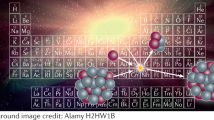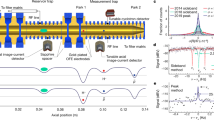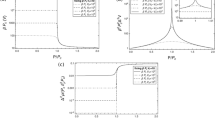Abstract
THE weak interaction constant G may determine the mean life of some elementary particles. If the muon mean life of 2.212 × 10−6 sec is equated to (1/2 πa) (λe3ħ/G) then G equals 1.48 × 10−49 erg cm3 (a is the fine structure constant and λe is the Compton wave-length of the electron). The charged pion mean life equals 1/4 (λeħ/G) or k while the ∑- hyperon mean life equals a k. Three types of particles may exist corresponding to the presence of a with exponents of − 1, 0, or +1 in a function giving the mean life of the particle.
This is a preview of subscription content, access via your institution
Access options
Subscribe to this journal
Receive 51 print issues and online access
$199.00 per year
only $3.90 per issue
Buy this article
- Purchase on Springer Link
- Instant access to full article PDF
Prices may be subject to local taxes which are calculated during checkout
Similar content being viewed by others
References
Horning, S. C., Nature, 195, 587 (1962).
Horning, S. C., Nature, 197, 369 (1963).
Author information
Authors and Affiliations
Rights and permissions
About this article
Cite this article
HORNING, S. Mean Life and Mass of Elementary Particles. Nature 197, 1091–1092 (1963). https://doi.org/10.1038/1971091b0
Issue Date:
DOI: https://doi.org/10.1038/1971091b0
Comments
By submitting a comment you agree to abide by our Terms and Community Guidelines. If you find something abusive or that does not comply with our terms or guidelines please flag it as inappropriate.



